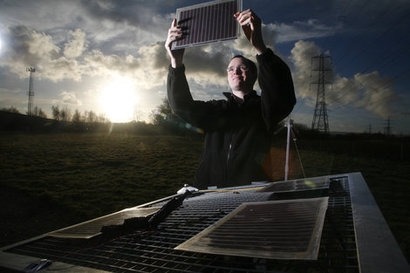
At present, the majority of PV cells are based on a crystalline silicon construction. While these have high power conversion efficiency characteristics, they are costly to fabricate as they require use of the highest purity silicon. However, thin film solar cells are relatively inexpensive to make and have numerous favourable deployment characteristics, despite lower power conversion efficiency and shorter operational lifespans than crystalline silicon.
The project being carried out by 2-DTech, with Dyesol’s support, will investigate the possibility of carefully engineered incorporation of graphene nanoplatelets (GNPs) within the perovskite charge collecting regions of thin film solid-state dye-sensitised solar cells. This in turn will boost efficiency and help to accelerate the uptake of solar PV by bringing solar cells to market that combine cost-effectiveness and high performance. Increased conversion efficiencies will result in a smaller installed area per unit of generated electricity, reducing the material requirements as well as carbon footprint of the manufacturing process.
Monolayer graphene encapsulation of the entire cell also has the potential to prevent moisture ingress affecting the perovskite layer, increasing the durability of this component in addition to reducing the external toxicity of solar cells based on these materials. The project will take a period of 12 months to complete.
“The UK Government has made a commitment to having 20 GW of installed photovoltaic capacity by 2020” said Nigel Salter, 2-DTech’s Managing Director. “If this is to be achieved there needs to a major advance in the photovoltaic technology being employed. The key to solar cell design lies in maximising charge collection and graphene could have a major part to play in this. With the financial backing of InnovateUK, 2-DTech will be able to evaluate its merits in this important application area.”
Dr Margherita Sepioni, Research and Technology Officer at 2-Dtech added that because of its remarkable conductivity and structural properties, graphene could enable a step change in the overall effectiveness of thin film solar cell technology - improving both the conversion efficiency and the cell durability. This would mean that the industry could be provided with photovoltaic devices delivering higher performance at a competitive point.
2-Dtech specialises in the development of graphene solutions and is engaged in the early stage implementation of products using graphene via the company’s own proprietary technology and expertise. The company was formed out of Manchester University’s pioneering work on graphene.
For additional information:

